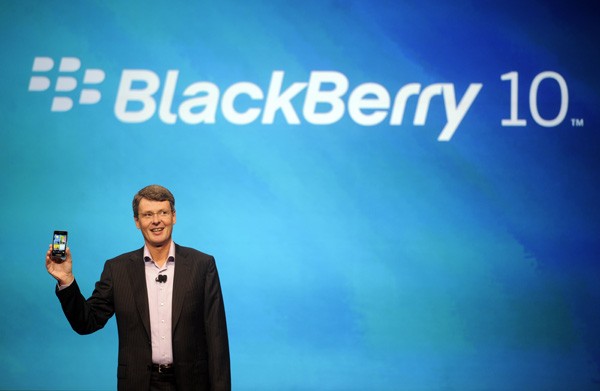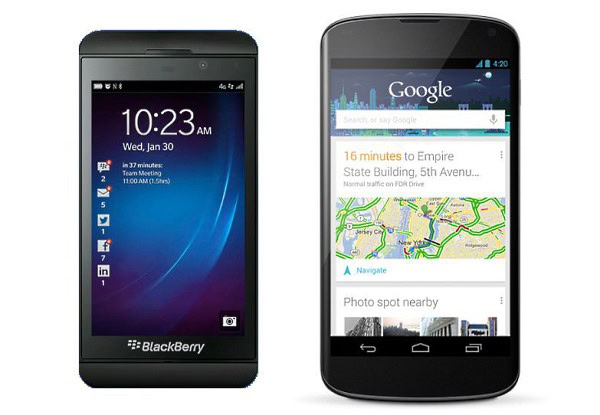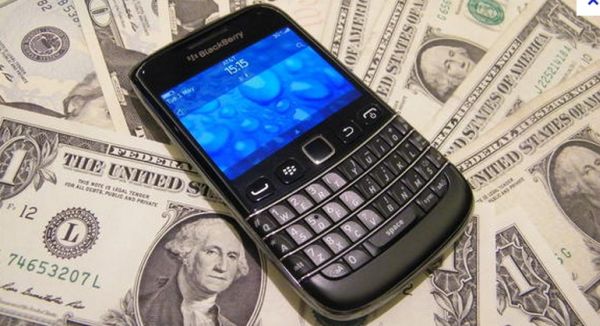Affiliate links on Android Authority may earn us a commission. Learn more.
What options does BlackBerry have for survival?

On the heels of the BB10 launch, we’re reminded of a statement made weeks ago. RIM’s (BlackBerry’s?) CEO, Thorsten Heins, said the BlackBerry maker would consider selling off branches to save itself from ruin. In the BlackBerry universe, everything hinged on a phenomenal BB 10 launch. It didn’t happen, so we’re left to wonder: if BlackBerry sells, who’s buying?
Forget about the lineage of mediocre devices and an OS that makes us shake our head in disappointment, what else does BlackBerry have going for it? Does its hardware division appeal to anyone? Is licensing the answer? Maybe it has an attractive patent portfolio that could prove useful, or perhaps the company as-is has the possibility of turning it all around.
Licensing
Outside of the U.S., BlackBerry still has a sizable presence. The BlackBerry Messenger (BBM) is still big in Europe and the Middle East, although recent outages have decayed user trust in the service. With service interruptions and a very absent product lineup as of late, it seems as though licensing the OS is a viable option. Perhaps a tandem of selling the hardware division and licensing the OS to a third party would be a savvy option… but then again, we’re talking about BlackBerry.
Consider yourself as a device manufacturer. If you have the option of licensing BlackBerry or building an Android handset, which would you choose? Would you create a device for the fastest growing platform on earth that happens to be free, or pay a nominal fee to build something that operates with a poor OS and a failing market share? Pretty much a no-brainer, right? People are fleeing BlackBerry in droves, so why jump aboard a sinking ship?

iOS may remain proprietary forever, but Android is free. Windows licenses its OS, and it is a much more attractive offering than BlackBerry. The BlackBerry device is going the way of rotary telephones, so it seems silly that anyone would license it. Manufacturers simply don’t have the confidence in BlackBerry to support them. Licensing also weakens the BlackBerry position in terms of control, as it would no longer have a way to manufacture its own goods and would be subject to a third party manufacturer’s whim.
Let’s examine Heins’ comments a bit more in depth. He says to license, BlackBerry must “show that the platform has significant potential. If such proof exists, a licensing is conceivable”. While that remains true, it also points to a very troubling fact for BlackBerry: BB 10 is the tipping point. BlackBerry hasn’t released a device since 2011, and even those devices (640 x 480 screen resolution, trackpad, 5MP camera) were behind the curve. A lot has changed, and for Blackbery to show potential, it would have had to change pretty dramatically.
Stay calm and carry on
BlackBerry also has the option to stay the course and battle on independently of any help. It can keep the hardware division, make devices, and travel the road it has so far committed to. It seems crazy to do so, but it may be the only option right now. If nobody is interested in paying BlackBerry for the hardware, patents, or licensing at this juncture, it’s because they are just waiting for the fire sale on the courthouse steps.
BlackBerry stock had also been sneakily rising like pizza dough lately. The stock rose about 10% in anticipation of today’s launch, which pushed its market capitalization to about $9 billion. That put BlackBerry in a position of power unto themselves, and it seem to enjoy that stance. BlackBerry likes trudging along independently: it suits the company, it is the company. A surge in capital would give BlackBerry more wiggle room to maneuver in the market, and the ability to show us a different side of BlackBerry. Unfortunately, that momentum was quickly lost. It lost roughly $1.5 Billion in market capital, and today didn’t yield the resurgence it had hoped for.
Marketing
To make an impact, BlackBerry would have to build an impressive, well thought out advertising campaign. It would have to show the consumers why a BlackBerry handset is better than what they had in their pocket, and that advertising would have to be everywhere. Think of a marketing campaign similar to Microsoft’s, only… you know… classy. Stand-up displays in stores with QR codes that know what kind of phone you scanned it with, then give you a comparison to the new BB 10, showing why it was better. TV ads hyping the speed, style, performance and screen of the new device. Internet banner ads that entice click-throughs. Instead, this long delayed launch was peppered with indignant pride and very little charm. Why is BlackBerry not making a big deal of this?!
Because it can’t. It doesn’t have the money to do so, and it knows the device and ecosystem is lacking. It knows (and knew) the device would appease die-hard BlackBerry fans, and maybe pick up a few old standbys who were on the fence about iOS or Android anyway. An increase in capital is great, but BlackBerry is in deep water financially, and didn’t want to spend money where it didn’t think it needed to. BlackBerry assumed the natural hype would market the device and OS for it, but it was wrong. To think BlackBerry will succeed by staying in business for itself is absolutely nuts. BlackBerry is a line-item fail across the board, and should take the momentum of today to sell itself off piecemeal at as premium a price as it can.

For sale
The best option for BlackBerry is to sell. Sell it all off, and walk away from the business. Shake hands on the way out, and know we all appreciate what you were. Trying to come back was valiant, but that just isn’t going to work. Someone will buy whatever you have to sell, but who? More importantly, why?
If BlackBerry does fold up and sell itself off piece by piece, it has a few things on offer. It has the hardware division, which probably holds more in terms of hard-line manufacturing than anything else. It also has the patent portfolio, which is essentially the company itself. You own the patents, you own the OS… and that could be beneficial to one particular duo. There is also a lot of things to be learned from BlackBerry in terms of mobile security, which is an increasing concern for everyone.
Apple
Apple is BlackBerry, only better. Apple has taken the BlackBerry playbook and redesigned it to fit this millenium, so there isn’t much Apple would really need from BlackBerry. Apple does, however, enjoy patents… and there may be more to the BlackBerry patent portfolio than we know. If anything in those BlackBerry patents are worth a damn, we’ll know it because Apple will bid strong.
Apple has also been making noise about moving its manufacturing process, so perhaps the hardware division of BlackBerry interests the company. I think if anything, it’s a passing fancy, and Apple may buy to sell it off. I don’t think there is much there for Apple to be truly interested in, so we shouldn’t read too much into its probable disinterest.
Google could be interested for a variety of reasons. Back in 2010, Motorola sued BlackBerry, asserting that it infringed on several patents relating to Wi-Fi, UI, power management, and application management. That suit was settled amicably, with BlackBerry and Motorola forging a cross-licensing agreement, but Google now owns Motorola. Bringing all those patents under the same roof would be great for Google. Not only that, but BlackBerry has also been in litigation with Kodak over digital image preview technology. It won the first round with Kodak, but then again… Kodak has been approved to sell patents to Google and Apple, so it once again presents an opportunity for Google to be in control.
The hardware division also presents an interesting wrinkle for Google. It owns Motorola, so it currently has device manufacturing capabilities, but does it need more? Another facility, or facilities, could help with production. Then again, it could just start making its own Nexus devices and really control the process entirely, allowing us to properly focus blame when the Play Store runs out!
Microsoft
Remember when I said the BlackBerry patents would be especially attractive to a certain duo? I was talking about the nerd and the nutjob, Gates and Ballmer. BlackBerry did one thing exceedingly well, and that was Business Enterprise. BlackBerry started, and always ruled, mobile business solutions (until recently). Microsoft always had a symbiosis with BlackBerry. Although never officially partnered, they worked marvelously together.
The Windows 8 OS is a cross platform nightmare, but BlackBerry may have a few tricks up its sleeve to help. BlackBerry ruled business for a reason, and that may be Microsoft’s best bet at a niche within the mobile landscape. It can’t beat Apple, and it’s certain to never come close to Android’s dominance. Purchasing the BlackBerry portfolio could be more useful to Microsoft than anyone else.
Amazon
That’s right.. Amazon. You know who makes the Kindle Fire? Some company named Quanta. Yeah, I haven’t heard of them either. Amazon is clearly getting them to make it on the cheap, but bringing that whole process in-house could yield long-term dividends for Amazon, which needs help to stay in the black. If Amazon purchased the hardware division from BlackBerry, it would instantly have device-making capabilities for the Kindle line as well as that oft-rumored Amazon Phone.
Patents are something Amazon never got into much, even though it has its own ecosystem. Why is that? Well, many patents relate to mobile technology in terms of cellular function. Amazon has built a very tight OS, but to integrate that into cellular technology and telephony is another matter. Having those RIM patents may strengthen its position for an Amazon Phone, and make it a strong player in the mobile device landscape. A cellular device with access to Amazon’s treasure trove of media is frightening for Android, and a death knell for Microsoft.

Conclusion
This isn’t about devices. It’s not about pixels, processor speed, or device build quality. It’s about ecosystems, pure and simple. BlackBerry didn’t lose us by failing to build great devices or staying current with hardware specs, it failed us by not building a home for us. Everything it has is third party fodder, and that disappears easily. Sure they have a lot of apps ported over, but it’s paying developers to port those… not support them.
It’s too late for BlackBerry to save itself. BB 10 will lose momentum before the week is out. The Z10 is a middle-of-the-road offering from a company that had us all wait two years for something new, and proof that BlackBerry is sinking fast. The signs were all there: Yahoo not allowing employees to get BlackBerry devices, major network outages, and shareholder dissent. The best advice anyone can give BlackBerry is this: sell everything. Take the money and run.